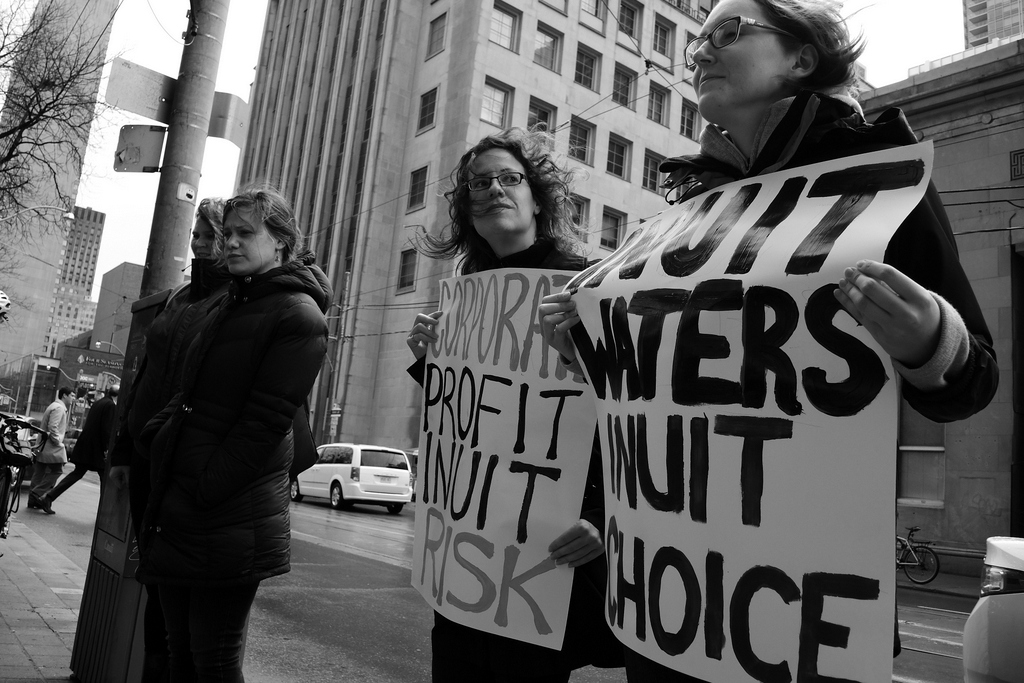In an attempt to reverse a 2014 National Energy Board (NEB) decision that allowed seismic testing in the waters inside Baffin Bay and Davis Strait, the Inuit community of Clyde River had their request for an injunction against oil and gas exploration companies heard on Monday at the Federal Court of Appeal in Toronto.
In 2014, despite widespread opposition from Inuits in Baffin Island, the NEB granted a five year license to a group of Norwegian companies to begin seismic testing this summer.
Click here to see more photos from the rally.
Greenpeace arctic campaigner Alex Speers-Roesch said seismic surveys fire loud air cannons underwater.
“They use the reflection of the sound off the sea floor to map out the underlying geologies so that oil companies know where they should drill for oil resevoirs,” said Speers-Roesch, in an interview Monday during a rally outside the Federal Court of Appeal.
“Firing loud sounds can be very disruptive to local marine life like fish and whales. If they’re close enough they can be killed or seriously damaged by it. But even if they’re not that close, it can disrupt migration patterns, cause stress and a host of other biological consequences that the Inuit of Clyde River and Baffin Island are concerned about.”
The Inuit depend upon those animals for their survival.
“It’s essential to their food security and the continuation of their culture,” he said.
In spite of unanimous opposition from Inuit to the seismic testing, the NEB allowed oil and gas exploration companies to proceed anyway.
“And that left the community of Clyde River no other option, other than to take them to court, to have the permit quashed and rescinded.”
Depending on the outcome of the appeal, it could proceed to a Supreme Court challenge.
“It’s hard to know what the judges will do,” he said. “But the community and Inuit of Clyde River feel that they weren’t properly consulted or accommodated prior to this project going ahead. And the granting of the license violates their right to free, prior and informed consent.”
Free, prior and informed consent refers to the rights of local communities, particularly Indigenous peoples, to participate in decision making about issues impacting them, especially natural resource management and economic development.
“Because they depend directly on their natural environment for a significant portion of their economy,” said Speers-Roesch.
“Imported food is very expensive in Nunavut and so foods that Inuit get from the land and the water form an important part of their diet, And so it’s important to protect that.”
These Arctic waters are home to 90 per cent of the world’s narwhals (an estimated 50,000), as well as bowhead whales, walruses, seals and 116 species of fish, according to a story published in the Canadian Press.
The David Suzuki Foundation said “A DFO report and an article in the Canadian Journal of Zoology show that seismic surveys increase noise levels to twice (20 dB) the normal level, and impact marine life.”
“Indeed, more and more scientists confirm that such surveys disturb the communication, navigation and eating habits essential to the survival of marine wildlife. These sonic waves can also damage fish with air bladders, destroy marine wildlife eggs and larvae, and incite fish and other marine species to temporarily migrate away from the affected area.”
Natanine, Iqalukjuak and the Clyde River community joined forces with Greenpeace Canada on July 23, 2014 to protest seismic testing in Baffin Bay and the Davis Strait.
Monday’s rally was organized by the Clyde River Solidarity Network, a group of organizations opposed to offshore seismic surveys for the oil and gas industry. In addition to the support of Idle No More and Amnesty International, several other organizations including Greenpeace and the Mining Injustice Solidarity Network have joined the campaign.
“To highlight what’s at stake for Clyde River, they’ve brought down country foods from Nunavut,” said Speers-Roesch.
Supporters were invited to sample raw beluga whale meat.




